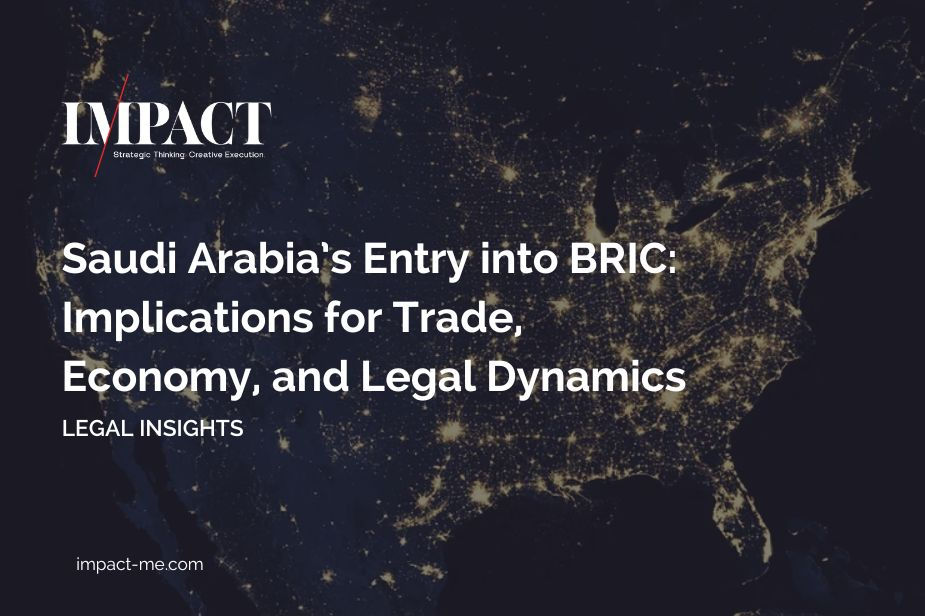Saudi Arabia’s Entry into BRIC: Implications for Trade, Economy, and Legal Dynamics
- Impact ME

- Oct 18, 2023
- 3 min read
Updated: Jan 2, 2024

The world of international economics and geopolitics is constantly in flux, driven by shifting alliances, economic growth, and evolving global dynamics. In this ever-changing landscape, the concept of the BRIC region has emerged as a significant force that has captivated the attention of economists, policymakers, and businesses alike. Originally consisting of Brazil, Russia, India, and China, the BRIC group has now expanded to include Saudi Arabia, the UAE, Egypt, Iran, Ethiopia, and Argentina. This expansion marks a momentous development that holds implications for global trade, energy, and cooperation. To truly understand the implications of Saudi Arabia’s entry into the BRICS group, it’s essential to delve into the origins and characteristics of the BRIC region itself.
BRIC’s Impact and Evolution
Over the years, the BRIC nation’s economies flourished, propelling them into the top echelons of the world’s economic hierarchy. China and India, in particular, showcased unprecedented growth rates and became manufacturing and technology powerhouses, respectively. Russia’s vast reserves of energy resources positioned it as a key player in global energy markets, while Brazil’s agricultural and natural resource wealth contributed to its economic prowess. The BRIC countries began to exert significant influence in global political forums, advocating for reforms in international financial institutions and seeking a more prominent role in global decision-making processes.
Increased Middle Eastern Footprint across the BRICS
The inclusion of five Middle Eastern nations as new members of BRICS starting from January 1, 2024, marks a significant shift in the dynamics of the global economic and geopolitical landscape, with far-reaching implications for the MENA (Middle East and North Africa) region. This move reflects these Middle Eastern countries’ growing economic prowess and strategic influence, highlighting their aspiration to be more substantial in shaping global policies and decisions. As BRICS seeks to promote economic cooperation, trade, and investment among its members, including these Middle Eastern nations, underscores their determination to diversify their economies beyond oil dependence and engage in broader international partnerships. This shift could potentially lead to increased stability in the MENA region, as it encourages dialogue, cooperation, and shared development goals among nations with varying cultural and political backgrounds.
Saudi Arabia’s Role in BRICS: A Game Changer
The BRIC grouping, initially comprising Brazil, Russia, India, and China, emerged as a compelling force in global economics. With Saudi Arabia’s inclusion, the newly formed BRICS bloc gains enhanced geopolitical and economic influence. Saudi Arabia’s substantial oil reserves and strategic location provide BRICS with a valuable energy resource and a gateway to the Middle East, strengthening the collective bargaining power of the group.
Trade and Economic Implications
Oil Production and Energy Dynamics:
Saudi Arabia’s oil production prowess, contributing *11.9% to global oil output, significantly impacts the energy market dynamics within BRICS. The country’s vast reserves can contribute to energy security and stability for the member nations, potentially mitigating supply shocks and price fluctuations. Additionally, this collaboration opens avenues for joint ventures in renewable energy technologies, diversifying the energy portfolio of the entire bloc.
Trade and Investment Opportunities:
With its position as a global energy hub, the nation can facilitate energy exports to the other members, ensuring a steady flow of resources while benefiting from their expertise in diverse sectors such as technology, manufacturing, and services. This cross-fertilisation of industries can lead to accelerated economic growth and technology transfer, bolstering the economic prospects of all BRICS nations, including Saudi Arabia.
Economic Diversification:
For Saudi Arabia, the BRICS association presents an opportunity to accelerate its Vision 2030 economic diversification agenda. Collaborations in sectors beyond oil, such as finance, technology, and agriculture, can reduce the country’s dependence on oil revenues, thereby promoting sustainable economic growth and stability.
Legal Considerations for Businesses
Trade Agreements and Regulations:
Businesses operating within the expanded BRICS region must familiarise themselves with the trade agreements and regulations that come with Saudi Arabia’s inclusion. This involves understanding the implications of tariff changes, import/export regulations, and compliance standards that may affect their operations.
Investment Laws and Intellectual Property:
Saudi Arabia’s legal framework for foreign investments and intellectual property rights might differ from other BRICS members. Companies looking to invest or establish a presence in the Saudi market must navigate these legal intricacies to ensure smooth operations and protect their intellectual property assets.
Dispute Resolution Mechanisms:
As business collaborations intensify within the expanded BRICS bloc, the need for effective dispute-resolution mechanisms becomes crucial. Businesses should be aware of the available avenues for resolving disputes, including arbitration and mediation, to safeguard their interests and maintain a conducive environment for international trade.
Saudi Arabia’s integration into BRICS marks a significant turning point for the global economy. The inclusion brings together diverse economies and industries, enabling collaborations that could redefine trade, energy dynamics, and economic growth. As businesses seek to capitalise on the opportunities arising from this transformation, a thorough understanding of legal considerations is paramount to navigating the complexities of international trade and investment. The expanded BRICS bloc, with Saudi Arabia at its core, has the potential to reshape the world economy and foster a new era of cooperation and prosperity.




Comments